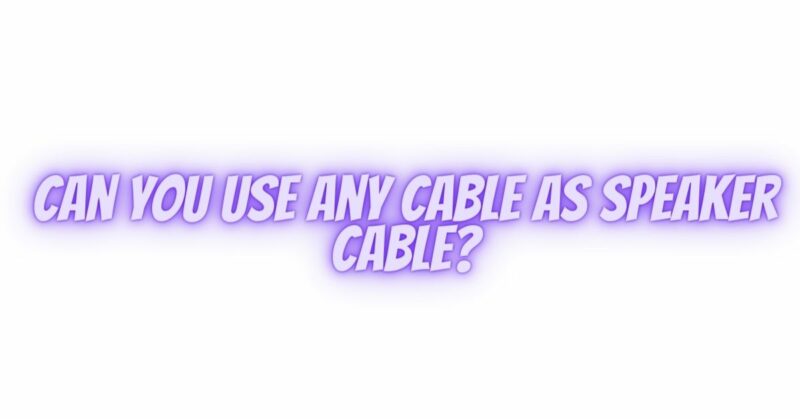When it comes to connecting speakers to audio systems, selecting the right speaker cable is essential for ensuring optimal sound quality and preventing potential damage to your equipment. While it might be tempting to use any available cable as speaker wire in a pinch, not all cables are suitable for this purpose. In this comprehensive guide, we’ll explore the factors that determine whether a cable can be used as speaker wire, the differences between speaker cables and other types of cables, and the potential consequences of using improper cables for your speakers.
Understanding Speaker Cables
Speaker cables, also known as speaker wires, are specifically designed for connecting audio amplifiers or receivers to loudspeakers. These cables are typically composed of two conductors, one for the positive (+) signal and one for the negative (-) signal. Speaker cables are insulated to prevent electrical interference or short circuits and are available in various gauges (thicknesses) to accommodate different power levels and cable lengths.
Factors Determining Speaker Cable Suitability
Several factors determine whether a cable can be used as speaker wire:
1. Conductor Gauge:
Speaker cables are available in various gauges (measured in American Wire Gauge or AWG), with thicker gauges capable of handling higher power levels. The gauge of the cable should match the power requirements of your speakers to prevent overheating and signal loss.
2. Number of Conductors:
Speaker cables typically consist of two conductors—one for the positive and one for the negative signal. This configuration is essential for maintaining the polarity and phase of the audio signal. Using cables with additional conductors or connectors may not be suitable for speaker connections.
3. Insulation:
Speaker cables are insulated to prevent electrical interference and maintain signal integrity. Insulation helps prevent short circuits and interference from nearby electrical sources. Cables without proper insulation may compromise audio quality and safety.
Using Improper Cables for Speakers
Using cables that are not designed for speakers can have several consequences:
- Sound Quality: Inadequate cables may result in signal loss and reduced sound quality, particularly at higher volumes or with high-power speakers. This can affect clarity, detail, and overall audio performance.
- Safety Hazards: Using cables with insufficient insulation can pose safety hazards, as exposed conductors may increase the risk of electrical shock or short circuits, potentially damaging your equipment.
- Equipment Damage: In some cases, using improper cables may damage your speakers, amplifiers, or other audio components due to mismatched impedance, power handling, or signal loss.
Common Misconceptions
There are several misconceptions about using alternative cables as speaker wire. It’s important to address these myths:
- Lamp Cord: Lamp cord, often mentioned as a DIY speaker cable alternative, is not an ideal choice. While it may work for very low-powered speakers in a temporary setup, it lacks the necessary insulation and conductor gauge for optimal audio quality and safety.
- Ethernet Cable: Ethernet cables are designed for data transmission, not audio signals. Attempting to use Ethernet cables for speakers can result in significant signal loss and audio degradation.
- Coaxial Cable: Coaxial cables are primarily used for transmitting RF signals and are not suitable for speaker connections. They lack the proper conductor configuration and gauge.
Choosing the Right Speaker Cables
To ensure proper audio signal transmission, maintain audio quality, and prevent potential equipment damage, it’s essential to use purpose-built speaker cables that match your specific audio setup. Consider factors such as cable length, conductor gauge, and insulation when selecting speaker cables. Using the correct cables designed for this purpose will help you achieve the best possible sound quality and ensure the safety and integrity of your audio system.


